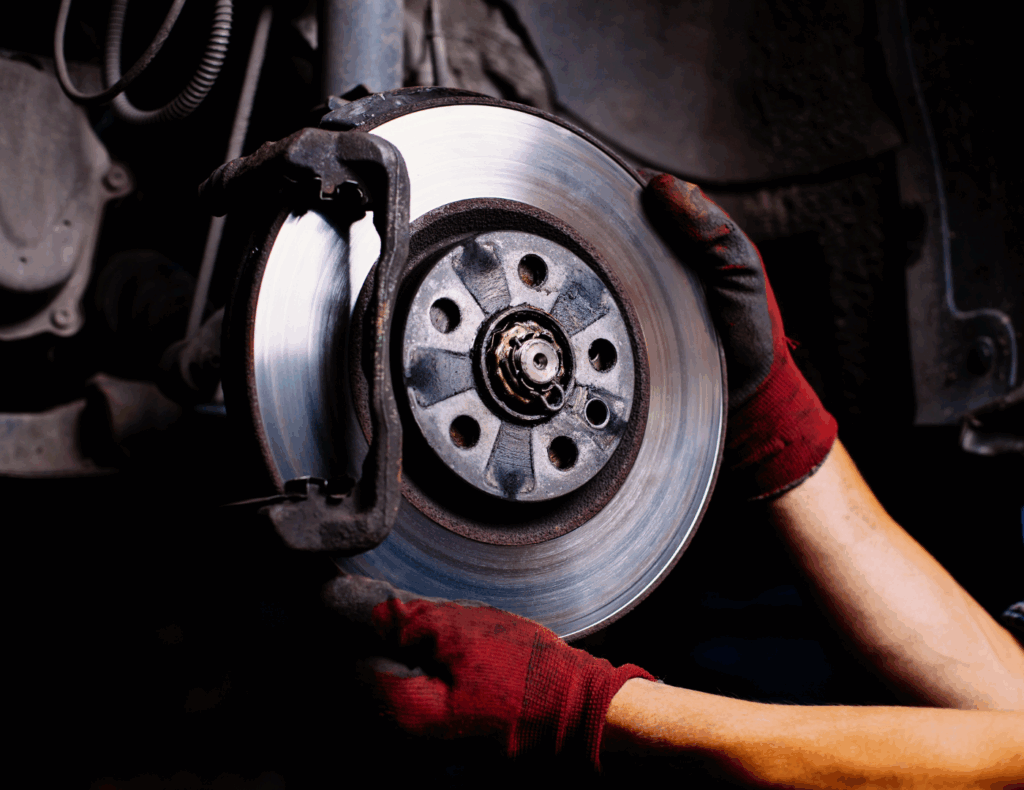What Happens During a Brake Inspection?
Your vehicle’s braking system is the most important safety feature it has. Whether you’re driving through the busy streets of Richmond Hill, dealing with stop-and-go traffic, or navigating icy Ontario roads in winter, you need reliable brakes that respond instantly.
A brake inspection service is designed to identify issues early, prevent costly repairs, and ensure you and your family are safe. At Mr. Mechaniq, we perform comprehensive inspections that go far beyond just “taking a look.” In this article, we’ll break down exactly what happens during a brake inspection and why it’s so important.

1. Brake Pad & Shoe Examination
Your brake pads and shoes are the first line of defense in slowing down your vehicle. They press against the rotors or drums to create the friction needed to stop your car. Over time, the friction material wears down, which reduces stopping power.
What we check: During a brake inspection, our technicians measure the thickness of your brake pads and shoes with precision tools. We also look for uneven wear, cracks, or contamination from oil or debris.
Why it matters: Worn pads not only increase your stopping distance but can also damage your rotors, leading to more expensive repairs. By catching the issue early, you save both time and money.
2. Rotor & Drum Condition Check
Brake rotors (in disc brake systems) and drums (in drum brake systems) are what your pads press against. Over time, they can develop grooves, warping, or cracks due to heat and friction.
What we check: We carefully inspect the surface of the rotors and drums for scoring, uneven wear, or heat spots. We also measure rotor thickness to ensure it meets manufacturer specifications.
Why it matters: A warped or damaged rotor leads to vibrations, squealing noises, and reduced braking efficiency. Sometimes rotors can be resurfaced, but if the wear is too severe, replacement is the safest option.
3. Brake Fluid Evaluation
Brake fluid is a hydraulic liquid that transfers the force from your pedal to the braking components. Without it, your brakes simply won’t work. Over time, brake fluid absorbs moisture, which lowers its boiling point and reduces effectiveness.
What we check: Our inspection includes checking the fluid level, testing the fluid quality, and ensuring there are no leaks in the system.
Why it matters: Old or contaminated brake fluid can cause soft pedals, longer stopping distances, or even total brake failure in extreme cases. Regular fluid checks and changes are vital for safety.
4. Brake Lines & Hoses
Brake lines and hoses carry the fluid under pressure to each wheel. If these components crack, rust, or leak, you could lose braking ability suddenly.
What we check: We inspect all visible lines and hoses for leaks, corrosion, bulging, or signs of wear.
Why it matters: Even a small leak in a brake line can cause total brake loss. Catching these issues early is critical to avoiding emergencies.
5. Caliper & Cylinder Check
Calipers and wheel cylinders are the “muscles” of your braking system. They push the pads or shoes against the rotors or drums. When these components fail, your car may pull to one side or experience reduced braking power.
What we check: During the inspection, we test the movement of calipers and check for seized pistons or leaking cylinders.
Why it matters: A faulty caliper or cylinder compromises your braking efficiency and can lead to uneven pad wear, overheating, or complete brake failure.
6. Parking Brake Assessment
The parking brake (or emergency brake) is often overlooked but plays an essential role in keeping your car secure when parked, especially on hills or icy winter roads in Richmond Hill.
What we check: We test the parking brake for proper tension, full engagement, and release. We also inspect the cables for wear or corrosion.
Why it matters: A weak or failing parking brake is dangerous, especially when parking on slopes. Ensuring this system works properly gives you peace of mind.
Why Brake Inspections Are So Important
Many brake issues develop slowly and can go unnoticed until they become serious. Regular inspections allow you to:
Detect problems before they become dangerous
Save money by avoiding major repairs
Extend the lifespan of your brake system
Drive with confidence in all conditions
Warning signs you need a brake inspection in Richmond Hill:
Squealing, grinding, or clicking noises when braking
Vibrations in the steering wheel or brake pedal
Increased stopping distance
A brake warning light on your dashboard
A soft or spongy brake pedal
If you notice any of these symptoms, it’s time to schedule a brake inspection right away.
Professional Brake Inspection Service in Richmond Hill
At Mr. Mechaniq, we take pride in offering thorough and reliable brake inspections tailored to your vehicle. Our certified mechanics in Richmond Hill are equipped with advanced diagnostic tools to evaluate every aspect of your braking system.
Whether you need new brake pads, rotor resurfacing, fluid changes, or a full brake system repair, we provide honest advice and high-quality service to keep you safe.
✅ Expert technicians with years of experience
✅ Transparent pricing with no hidden fees
✅ Convenient service in Richmond Hill, Ontario
✅ Customer-focused care for your peace of mind
Book Your Brake Inspection Today
Don’t wait until it’s too late. Regular brake inspections are the simplest way to protect yourself, your passengers, and your vehicle.
Contact Mr. Mechaniq today to schedule your professional brake inspection in Richmond Hill and experience the confidence of safe driving.

